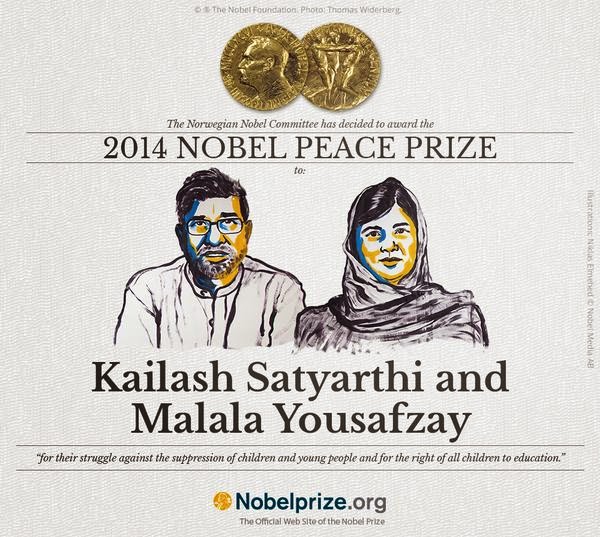Malala Yousafzai, the Pakistani teenage education campaigner shot on school bus in 2012 by a Taliban gunman, has won the 2014 Nobel peace prize.
Malala won along with Kailash Satyarthi, an Indian children’s rights activist who is famous for his “Bachpan Bachao Andolan”.
The two were named winner of the £690,000 (8m kronor or $1.11m) prize by the chairman of the Nobel committee – Norway’s former prime minister Thorbjoern Jagland – on Friday morning.
Indian rights activist Kailash Satyarthy and Pakistan’s Malala Yusafzai have together been awarded the prestigious Nobel peace prize for this year. The Nobel Committee said it was “an important point for a Hindu and a Muslim, an Indian and a Pakistani, to join in a common struggle for education and against extremism.”
17-year-old Malala Yusafzai, who was shot at by the Taliban in 2012 for protesting against curbs on girls attending school in her town in the Swat Valley, is Pakistan’s first Nobel laureate.
“The voice of crores of children has been heard,” Mr Satyarthi said.
The Nobel Committee said the two activists had been awarded for their “struggle against the suppression of children and young people and for the right of all children to education.”
The panel said Mr Satyarthi had, showing great personal courage and maintaining Gandhi’s tradition, headed various forms of protests and demonstrations, all peaceful, focusing on the grave exploitation of children for financial gain.
On Malala, whose remarkable story of survival has moved millions across the world, the committee said she has shown by example that children and young people, too, can contribute to improving their own situations. “This she has done under the most dangerous circumstances. Through her heroic struggle she has become a leading spokesperson for girls’ rights to education,” the committee said.



